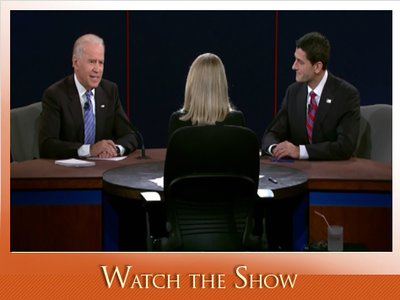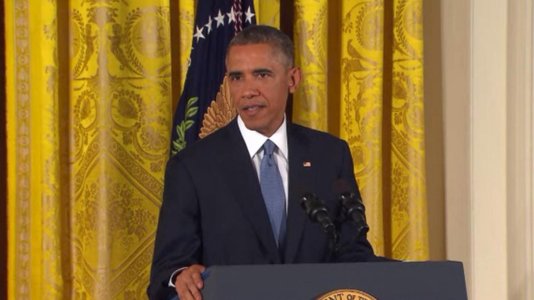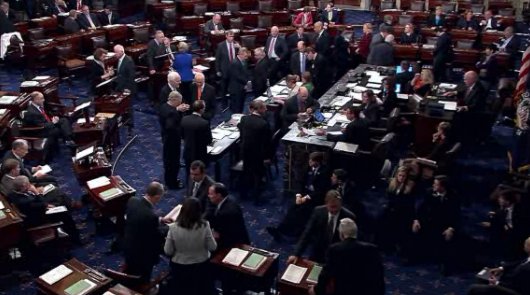We look at why the White House and Congress could not reach a deal to avoid the sequester before the March 1 deadline. Plus, the potential economic impact of mandatory federal spending cuts. Also, we analyze the Supreme Court case that challenges a key part of the Voting Rights Act of 1965. Joining Gwen: Joan Biskupic, Reuters; Gloria Borger, CNN; and David Wessel, Wall Street Journal.
GWEN IFILL: A meat cleaver falls on the federal budget tonight, but will there be blood? And the Supreme Court tackles the Voting Rights Act, tonight on “Washington Week.”
PRESIDENT BARACK OBAMA: (From tape.) This is not going to be an apocalypse. It’s just dumb. And it’s going to hurt.
MS. IFILL: Time ran out today as big budget cuts kicked in. And there may be more pain to come.
REPRESENTATIVE JOHN BOEHNER (R-OH) [Speaker of the House]: (From tape.) I’m hopeful that we won’t have to deal with the threat of a government shutdown while we’re dealing with the sequester at the same time.
MS. IFILL: Lawmakers are calling the crisis “dumb,” “manufactured,” a “ploy,” but now the across-the-board budget cuts are law. We examine the impact. And at the Supreme Court, challenge to a historic law. How far should the federal government go to enforce voting rights?
ANTONIN SCALIA [Associate Supreme Court Justice]: (From tape.) I think it is very likely attributable to a phenomenon that is called perpetuation of racial entitlement.
SONIA SOTOMAYOR [Associate Supreme Court Justice]: Do you think that racial discrimination in voting has ended, that there is none anywhere?
MS. IFILL: Covering a big week in Washington, Joan Biskupic of Reuters, Gloria Borger of CNN, and David Wessel of the Wall Street Journal.
ANNOUNCER: Award winning reporting and analysis, covering history as it happens, live from our nation’s capital this is “Washington Week with Gwen Ifill.”
(Station announcements.)
ANNOUNCER: Once again, live from Washington, moderator Gwen Ifill.
MS. IFILL: Good evening. There is something baffling about where we find ourselves in Washington tonight. Lawmakers spent the better part of the day and the week daring each other to meet in the town square at high noon.
And when they did, neither liked the outcome all that much. The president popped into the White House Briefing Room today at times expressing frustration, other times high mindedness, but making clear who he blames for the budget standoff.
PRESIDENT OBAMA: (From tape.) I am not a dictator. I’m the president. So, ultimately, if Mitch McConnell or John Boehner say we need to go to catch a plane, I can’t have Secret Service block the doorway.
This idea that somehow there’s a secret formula or a secret sauce to get Speaker Boehner or Mitch McConnell to say, you know what, Mr. President? You’re right. I think if there was a secret way to do that, I would have tried it.
MS. IFILL: House Speaker John Boehner offered a much briefer statement as he left the White House meeting today and he was more grim.
REP. BOEHNER: (From tape.) Let’s make it clear that the president got his tax hikes on January 1st. This discussion about revenue, in my view, is over. It’s about taking on the spending problem here in Washington.
MS. IFILL: So tonight, the much discussed $85 billion budget cut decried by economists and politicians alike takes effect. And then what, David?
DAVID WESSEL: Well, we’ll find out. Finally, we go over one of these lines in the sand.
MS. IFILL: Yeah.
MR. WESSEL: Look, this was designed to be unworkable and uncomfortable to force Congress and the president to do something else. The technical term for this is “stupid.” That’s attributed to Alan Simpson and Erskine Bowles, you know, the grand old man of deficit fighting.
So what happened here is that Republican – the White House has been screaming this is going to be the end of the world. Despite what the president said, they have made it seem pretty apocalyptic. Republicans say it’s not going to be so bad. The White House says, oh, yes, it will because it’s so rigid, it has to be across the board, all the stuff. The Republicans says, OK, we’ll make it flexible. The president says, oh, no, no. That’s not enough. And that’s not going to help. So here we are.
And I think the question is what happens on Monday. Well, the government is not going to grind to a halt on Monday. It’s – this is going to build overtime. And the question is whether enough of the damage is done, people really being inconvenienced, people not getting benefits because they can’t get through to the office, long lines at the airport, that there’s some pressure on Congress to do something. And that appears to be the president’s strategy, to hope that there will be pressure.
MS. IFILL: Well, Gloria, if both sides hate this outcome, did somebody miscalculate?
GLORIA BORGER: Yeah. I think there was a lot of miscalculation here.
MS. IFILL: Yeah.
MS. BORGER: First of all, here – here’s what happened. The fiscal cliff – we didn’t go over the fiscal cliff. They got a deal.
MS. IFILL: At the end of the year.
MS. BORGER: They got a deal at the – January 1st, we all remember that. They got a deal on the fiscal cliff.
MR. WESSEL: To raise taxes.
MS. BORGER: To raise taxes. So Republicans, seven weeks ago or whenever it was, had to raise taxes. I believe the White House miscalculated or underestimated, or whatever you want to call it, the Republicans in saying, OK. They’re going to now close these loopholes, which is effectively raising taxes again, after they just did that seven weeks ago.
I also believe that Republicans could be in the process of underestimating how this could affect their standing with the public. Right now, they’ve got a 29 percent favorability rating. The president is at 49 percent. He’s gambling that the public will be with him, because, after all, he got reelected partially on this issue of fairness.
MS. IFILL: And he’s reading the polls and he knows.
MS. BORGER: And he’s reading the polls. And the Republicans are saying, you know what? We’re on the right said because the public believes the government should be smaller and more efficient. The problem that the Republicans have is that this particular skinny slice of the pie we’re talking about is all the popular stuff. It’s Head Start, you know, it’s teachers, it’s –
MS. IFILL: Veterans.
MS. BORGER: Veterans. It’s a lot of stuff that people care about.
MR. WESSEL: Well, I think also that the White House figured that because this thing was written so the cuts in defense were so deep –
MR. BORGER: Right.
MR. WESSEL: – that that would prevent the Republicans from accepting it.
MR. BORGER: Exactly. That’s another –
MR. WESSEL: But the thing that’s scary is – so we’ve had these lines in the sand drawn. We had it on the debt ceiling. We had on the fiscal cliff, and they never went over it. This time they went over it and neither side seems to have a clear way out of it. And they’re going to do some real harm.
Ben Bernanke and the Congressional Budget Office say if these cuts stick the way they’re written, it will cost us 750,000 jobs this year. Now, that’s a drop in the bucket of 135 million jobs in the economy, but it’s a half of percentage point in the unemployment rate. So now they’re really in – they’re doing some real risk to the economy. It’s not theoretical anymore.
JOAN BISKUPIC: Yes. I was wondering about when it will really feel and we’ll all know it’s not theoretical because, obviously, this day came and it didn’t have the horrific burden on people.
MS. BORGER: Well, now, we’ll know. We’ll know when the lines get long at the airports and we’ll –
MS. BISKUPIC: And what about the end of March, when we have another – (inaudible) – with the budget?
MR. WESSEL: I think we basically have – it will be a month before – I mean, people are furlough notices. Now, if you’re a federal employee and you get this notice to say, this is to put you on notice you’ve got to take a day off every two weeks, that’s pretty bad. And people are going to be upset. But in terms of the public, until the layoffs actually come, people start worry a bit. But you’re right. We’ve got this thing at the end of March.
MS. IFILL: Well, take a minute and look at how the two sides play this. Obviously, we’ve seen – I think if you’re a cabinet member who has not been summoned to a podium somewhere to say how terrible this is, you clearly should be looking for another job because they’ve all been out there. And Republicans have a different view. Let’s listen to two.
SECRETARY OF HOMELAND SECURITY JANET NAPOLITANO: (From tape.) And now I’m put between the rock and the hard place. And I shouldn’t have to go to court for Congress to figure out a budget for the Department of Homeland Security and for the federal government at large. We can do this in a balanced way.
SENATOR MITCH MCCONNELL (R-KY) [Minority Leader]: (From tape.) The president has been running around acting like that world is going to end because Congress might actually follow through on an idea he proposed, he proposed and signed in the law, all the while pretending he’s somehow powerless to stop it.
MS. IFILL: Now, the blame game is a big part of what we saw this week and we just saw it there.
MS. BORGER: Well, the Republicans are saying it’s his fault, he did it. They call this the, quote, “president’s sequester.” They did that –
MS. IFILL: They tried to call it Obamaquester for a while, but that didn’t really catch on.
MS. BORGER: Obamaquester. Right. They did that after the meeting – they did that after the meeting at the White House on Friday morning. And the president came out in his press conference and said, this is the Republicans’ choice. They are choosing to do this. He used the word “choice” and “Republican” together a few times. So it’s clear the blame game is in full swing. I believe that in the – when all of this is over, the public is going to look and say, you know what? You guys needed to figure out – both of you, children, needed to figure out a way to prevent this and stop pointing fingers at each other.
MS. IFILL: I do say this does remind me of when you’re driving down the street with kids in the backseat and when you tell them to stop squabbling, they say, but he did it first. I don’t think any of us have a lot of patience for it so I can’t imagine American people do as well.
MS. BISKUPIC: Right. They’re saying, don’t make me stop the car, right?
MR. WESSEL: Our poll shows that the public thinks this is a bad idea, but then they’re divided on – half of them want more cuts and half of them want fewer cuts so this one is not going to be resolved by public opinion.
MS. BORGER: And the reason this is different and the reason this is occurring is because when you had the fiscal cliff on January 1st, Democrats and Republicans knew they couldn’t let the taxes for everyone go up.
MS. IFILL: Right.
MS. BORGER: When you had the debt ceiling problem, they knew Republicans and Democrats that the full faith and credit of the United States of America was on the line. At the end of March, they all know you do not want to shut the government down. In this particular case, they’re like, oh, we have some budget cuts here.
MR. WESSEL: I think that the Republicans want to have a fight on spending. That’s what we’ve got here.
MS. BORGER: Exactly. Exactly.
MR. WESSEL: But I think the point you made, I disagree with it slightly. You said this is the popular stuff being cut. Well, Medicare and Social Security are pretty popular too. And that’s the irony. The stuff that’s driving the deficit are the things that are not subject to this cut.
MS. IFILL: Well, and that’s what I want to talk about. I mean, it seems to me that there is a big issue that is on the table and that perhaps, let’s turn this on its head, there is some secret genius behind all this, that we were never going to get to deal –
MS. BORGER (?): I wouldn’t go that far.
MS. IFILL: OK. Maybe not genius, but they were never going to get to the point where they are thinking about cutting anything unless they were up against the wall, and that’s what we’ve seen, the wall.
MR. WESSEL: Well, it certainly is the case that it’s a cliché in Washington that Congress never acts until there’s a crisis.
MS. IFILL: Right.
MR. WESSEL: And they’ve been trying to manufacture crises for the last couple of years with these deadlines. And this may be the one to bring them to the table. I think there’s a chance that after a couple of weeks of this, it looks unseemly that there will be a group of people in the Senate, where there does seem to be some interest in one of these bargain deals, that will come up with something. It’s probably is the short-term thing with some promise of something longer, but that will – the adults in the Senate will rise to the occasion.
MS. BISKUPIC: But they’re settling about another short-term situation.
MR. WESSEL: Right. Paycheck to paycheck.
MS. BISKUPIC: Wait a minute. Where will be the motivation to finally do something comprehensive?
MR. WESSEL: I don’t think there is any.
MS. BORGER: And there may not be. And the problem on the revenue side is that Republicans say, OK. We’re willing to close these tax loopholes and think of revenues, but only in the context of overall tax reform. And so the question: is how do you get to tax reform and entitlement reform, do the kind of grand bargain that’s been talked about that you just sort of hinted at, until you get over these kind of speed bumps?
MS. IFILL: But we saw John Boehner – we just saw him walk out today and say, well, at least we’re not going to shut down the government. What was that about? Where did that come from?
MR. WESSEL: I think that the Republicans learned in the Gingrich era that shutting down the government seems like a good idea but the public doesn’t like it.
MS. IFILL: But there is no deal not to shut down the government.
MR. WESSEL: No, but – well, there’s a continuing resolution which keeps the government funded through March 27th. And I think what the speaker is saying is we’re going to try and avoid having a confrontation on that. We’re going to extend the spending at this low level, lower than the president wants, and figuring that the president will agree to this for the rest of the year. So that’s what they’re saying.
MS. BORGER: And so these cuts, the forced spending cuts that we’ve been talking about, that was a hint that you could resolve that issue of funding the government without first resolving this issue of these spending cuts we’re going to see going ahead.
MS. IFILL: Do entitlements ever get on the table?
MR. WESSEL: Well, the president has, to be fair, put some entitlements on the table. He’s offered some cuts to Medicare. And he’s made something which is unpopular with his base, this idea of changing the way they do the inflation adjustment for tax brackets in Social Security.
Look, everybody – in a sense, everybody can kind of sketch what the likely deal is here. It’s going to be some kind of revenue raising reform that doesn’t raise rates but closes loopholes or gets rid of some credits somehow and does something about Medicare and Medicaid. So I think they get on the table because, at some point, they’re going to run out of the – running room on these – on cutting the other stuff.
MS. BISKUPIC: I was going to ask about the president’s message in the briefing room today. He had brought out so many cabinet secretaries to say it was going to be the end of the world, these cuts were going to be horrific. But then, as he stood up there, he said, well, it’s not that I’m saying that it’s apocalyptic. It’s just that it’s dumb. I mean, do we see a shift in his rhetoric now?
MS. BORGER: We’ve seen a shift because we’re going go past this crisis and the cuts are going to go into effect. I think part of their public relation strategy early on was to say the sky is falling, the sky is falling and kind of push the Republicans into a position where they had to compromise. And the Republicans said, no, and they dug in. And so now that they’ve dug in and we’re going to go over the cliff, it’s a question of leadership and the president has to say, OK, we can live with this for a little bit.
MS. IFILL: In the meantime, we should say there is something real to this. There are long-term unemployed who are not going to be able to get checks.
MS. BORGER: Yes. Absolutely. Absolutely.
MS. IFILL: And there are people who, perhaps, if nothing is resolved by April, will see their jobs go away. I mean, there is real pain.
MR. WESSEL: Absolutely. Absolutely. And there – you’re absolutely right. And Medicare – the payments to doctors in hospitals will be cut and stuff. So that’s right. Just that it’s going to mount slowly overtime.
MS. BORGER: And that may force them to the table.
MS. IFILL: Well, that’s –
MS. BORGER: That may.
MS. IFILL: And we’ll be at the table or outside the table or something. We’re not done with this yet.
So now we go over to the Supreme Court, where the justices were confronted this week with a challenge to Section Five of the Voting Rights Act of 1965. It requires certain states with a history of disenfranchisement to check with the federal government before they change election laws that could affect voter access.
The arguments pitched titans of the civil rights movement against jurisdictions that say times have changed and federal oversight has now become federal intrusion. This is one of the major cases before the Supreme Court this session, isn’t it?
MS. BISKUPIC: Gwen, it’s not just one of the major cases in this term. It could be one of the most major cases in decades, because it involves this pillar of the civil rights era, the 1965 Voting Rights Act. And the Section Five is a core part of it that’s been used over and over to deter southern jurisdictions mostly, but other places that have had a history of discrimination.
What it does is it requires a place that, again, has had a history of discrimination, to first clear with the federal authorities any kind of change in voting map, any kind of new voter ID law, anything that could possibly harm minorities.
MS. IFILL: They move a polling place.
MS. BISKUPIC: Yes. Right. And that happens a lot. And we still have had cases. In fact, it’s interesting. The saliency of this issue was seen in the 2012 presidential election when Texas voting maps were blocked. Texas voter ID law was blocked because of this law.
So it’s very relevant today, even though the formula that’s used to designate these southern jurisdictions that fall under it traces to the ’60s and ’70s. And the issue for the court was, is that formula still constitutional and is it still singling out the right places at a time when there’s also violations up in the north of voting rights in different ways?
MS. BORGER: So did you get any sense?
MS. BISKUPIC: Well, I can say – I can tell you this, that definitely the five conservatives seem strongly against this provision, feeling like it has run its course, that if there’s going to be any voting rights discrimination, go after it case by case, where you can actually prove an incident, rather than having certain states, like Alabama, where the case was brought from – pre-clear these things.
But the liberals really came down strong on the idea that it is from Alabama, where there’s been so much trouble. You know, just think of – in 1965 when this measure was first enacted, it came only because of civil rights marchers in Selma being beaten by state troopers. There’s a lot of history to Alabama. And Justices Elena Kagan and Sonia Sotomayor and Ruth Bader Ginsburg really pounded away at that saying essentially do you want this provision to go down in a case from Alabama?
MR. WESSEL: Now, this law passed Congress 98 to zero originally, so where does –
MS. IFILL: Reauthorized, yeah.
MS. BISKUPIC: Yeah. Right.
MR. WESSEL: So why – how did the – the conservatives on the court, how did they justify striking down something that has been so popular?
MS. BORGER: Being an activist court?
MS. BISKUPIC: Well, here it is. It really does go to Congress’ power. Congress’ power to prevent discrimination and to remedy any violations of the 15th Amendment, which gave blacks the right to vote. And it was passed in the Senate, as you say, by a 98 to zero vote. It was passed by a lopsided margin in the House. It was a Republican-dominated House. It was signed by George W. Bush. It has great, huge bipartisan support over the years. And the question – and Justice Scalia said, you know, 98 to zero maybe is because everybody thinks it’s so political unpopular to vote against any kind of racial measure. In fact, at one point, he used the term “racial entitlement.” But the point was –
MR. WESSEL: But that was – I thought that was democracy, but –
MS. BISKUPIC: Right. Right. And, frankly, a lot of people drew back and I think even some of his fellow conservatives don’t like that kind of phrasing at all. They would not see it this way.
MS. IFILL: Can I ask you this? In the chamber, when he said that, was there a kind of intake of breath or does that sort of thing just –
MS. BISKUPIC: Well, just as loud as it gets, Gwen. There is no audible gasping and that’s pretty important.
MS. IFILL: No. No.
MS. BISKUPIC: But there was. But it got everybody’s attention. It got so many people’s attention that Justice Sotomayor then went back to it and asked the lawyer for Shelby County, Alabama, saying, do you think that race discrimination still exists in America? Do you think this is racial entitlement?
MS. BORGER: So is there any possibility of any middle ground here?
MS. IFILL: Or ever in the court?
MS. BISKUPIC: Right.
MS. BISKUPIC: Not on this.
MS. BORGER: And then we raise the name of Justice Kennedy when we think –
MS. BISKUPIC: Yeah. Justice Kennedy clearly is a swing vote on this again. But this is a harder case to find middle ground. In 2009, when they took up the same issue with a case from Texas, they were able to say, well, this little boating district in Texas could be exempt from this so we’re not going to reach the large constitutional question about whether Congress was within its power to reauthorize Section Five. This time, there really is no middle ground. The most middle ground will be I think if they say, Alabama, not you. It was close.
MS. IFILL: But why not use Section Two? That’s part of the argument, this and use the idea that this is intentional discrimination as a way of solving these problems when they arise.
MS. BISKUPIC: Right. And Gwen is referring to another part of this great landmark act that says – Section Two that says, once you find a violation, you come and you sue. Well, the advocates who want Section Five to remain on the books say that is time consuming. It’s costly. Certain jurisdictions will – once you get one measure struck down will create another way that interferes with voters. And, frankly, in 2012, we did see some of that.
MS. IFILL: Yeah.
MS. BISKUPIC: Now, we did see it also in the north in jurisdictions that aren’t covered by Section Five, but we saw plenty of it in the south.
MS. IFILL: I want to ask you about another case that’s making its way to the court. And the administration actually weighed in on it the other day. And it’s about gay marriage and Proposition Eight, this effort to strike down gay marriage in California. We finally heard from the White House on this.
MS. BISKUPIC: That’s right. The federal government wouldn’t naturally be involved in this case because it’s between – you know, the state, actually people who are now defending Proposition Eight, and challengers, same-sex couples who want to get married.
And the question was, would the Obama administration come in on this major case that might for the first time say that there’s a really strong right to same-sex marriage out there or least strike down the Proposition Eight law in California, and perhaps even say there’s a fundamental right nationwide –
MS. BORGER: Constitutional.
MS. BISKUPIC: Exactly. And what the administration said was there is a federal interest. We don’t think Proposition Eight should stand. And we also don’t think that other states that have allowed civil unions should stop there. They should be able to say marriage too.
MS. BORGER: But the administration didn’t go sort of whole hot on this.
MS. BISKUPIC: No. No.
MS. BORGER: They didn’t buy the entire or – it’s not that they didn’t buy it, although the president in his press conference seemed to buy it a little bit more than the Justice Department, but they didn’t go whole hog and say, this is a right guaranteed under the constitution.
MS. BISKUPIC: Right. And that would be – that’s the farthest.
MS. BORGER: Right.
MS. BISKUPIC: That’s what the main challengers to Prop Right are saying that it’s a fundamental right and the administration said, not yet.
MS. IFILL: And that’s going to come up – the arguments are –
MS. BISKUPIC: On the 26th and 27th of March, which, frankly, coincides with the –
MR. WESSEL: The CR.
MS. BISKUPIC: I know.
MS. IFILL: Congressional – oh, boy, we’re going to do back around – having the same conversation at the end of the month.
MS. BISKUPIC: Yeah. It’s going to come back.
MR. WESSEL: No. Please no.
MS. IFILL: Thank you everyone. I’m sorry. We have to leave you a few minutes early tonight so you can take advantage of the chance to support your local PBS station which, in turn, supports us.
There’s so much we couldn’t get to, as you could tell, but, as usual, we’ll pick up where we left off in the Washington Week Webcast Extra. You’ll be able to find us online still talking at pbs.org/washingtonweek. And while you’re there, you can read my take on the sequester debate. Keep up with daily developments over at the PBS NewsHour and we’ll see you again right here, next week, on “Washington Week.” Good night.

































